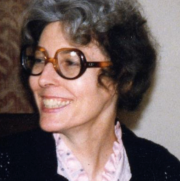
Louise George Clubb
Professor of Comparative Literature and Italian Studies, Emerita
Louise George Clubb, who passed away on January 15, 2025, was Professor Emerita of Comparative Literature and Italian Studies, with a long and distinguished career on the Berkeley faculty from her initial appointment in 1966 until her retirement in 1994.
She was a noted scholar of European Renaissance literature, with a special—but by no means singular—focus on Italian Renaissance drama and its influence on Shakespeare. Her most noted contribution was the concept of “theatregrams,” which she identified as interchangeable parts of plays, most prominently visible in Shakespeare’s use of Italian commedia dell'arte character types. But her scholarly work on the Renaissance was much broader than this. Her books include Giambattista della Porta, Dramatist (1965); Italian Plays (1500-1700) in the Folger Library: A Bibliography with Introduction (1968); Giambattista della Porta: Gli duoi fratelli rivali/The Two Rival Brothers (1980); Italian Drama in Shakespeare’s Time (1989); Romance and Aretine Humanism in Sienese Comedy, 1516: Pollastra’s “Parthenio” at the Studio di Siena (1993, with Robert Black); and Pollastra and the Origins of “Twelfth Night”: “Parthenio” (1516) (2010). A volume of her essays was published in 2024 as Renaissance Theatergrams: From Italy to England. She was the general editor of the University of California Press’s bilingual series of books, the Biblioteca Italiana.
Two years before her death, Clubb contributed to the 150 Women Project at Berkeley, reflecting on the start of many promising academic careers, a half-century earlier:
https://escholarship.org/uc/item/0qm983ws
Louise Clubb was a Guggenheim Fellow in 1965-66 and served as Director of Harvard’s Villa I Tatti in Florence from 1985-1988. At Berkeley, she was an active and vital member of the Academic Senate, serving on numerous Senate committees, including the Committee on Budget and Interdepartmental relations (chair, 1975-76) and the Committee on Academic Planning and Resource Allocation. She also served as Dean of Humanities in 1989-90. In the face of the budget crises of the early 1990s, she played a crucial role in keeping Italian Studies alive. She was especially supportive of younger scholars, noted for her generosity and openness to their work. Louise was a core member of the group known as the “Little Thinkers.” In her later years, she was a dynamic participant in the “Learning in Retirement” program.
Louise Clubb was also a passionate musician, who had achieved and sustained a high level of proficiency at the piano. She had a particular fondness for chamber music and played often with her late husband-scholar, Will Clubb, and after his passing, with Berkeley colleagues and friends. In her last years she spent time with a close colleague reading Milton’s Paradise Lost, a poem that she described as the “scholars’ reward.”
Anthony J. Cascardi
